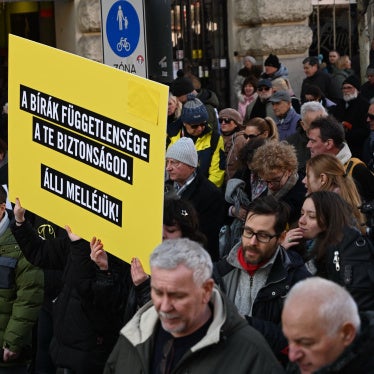Human Rights Watch is profoundly grateful for the efforts of the United Nations Commission on Human
Rights, and in particular for your strong personal leadership, to stop atrocities in Chechnya and hold
accountable their perpetrators. It was thanks largely to your commitment to justice and basic U.N.
human rights principles that in April the Commission adopted a resolution deploring abuses in
Chechnya and calling on Russia to investigate them.
CHR Resolution 2000/58 represented perhaps the broadest consensus among international actors that impunity would not be countenanced in Chechnya. Many viewed implementation of the resolution as the best hope for accountability. After its adoption, governments and international organizations that had pressed for accountability set aside alternative measures, such as an interstate complaint before the European Court of Human Rights, in favor of the process set out in the resolution.
The resolution called on Russia to take specific action to investigate violations of human rights and international humanitarian law and to cooperate with intergovernmental and nongovernmental agencies seeking to conduct their own inquiries. The centerpiece was a requirement that Russia establish a national commission of inquiry to investigate abuses, in order to hold accountable their perpetrators. This signified that henceforth Russia's commitment to accountability would be assessed by the way in which it mounted a credible and impartial inquiry. The resolution also urged Russian cooperation with U.N. thematic mechanisms, which were to be deployed to the conflict zone, and with the Organization for and Security and Cooperation in Europe, the Council of Europe, the International Committee of the Red Cross, and other international and regional organizations.
As you know, prior to the resolution's adoption, Human Rights Watch was profoundly skeptical that the Russian government would launch a credible national commission of inquiry that would result in a transparent and thorough accountability process. The authorities had taken no step that indicated a sincere intention to investigate war crimes and other abuses committed by Russian forces in Chechnya. Unfortunately, this situation has not changed in recent months.
The Russian government rejected the resolution and refused to implement its chief requirements in a transparent manner. Five months after the resolution's adoption, Russia has made no meaningful progress toward establishing accountability for abuse. It has effectively denied access to the conflict zone for thematic rapporteurs but has, to its credit, permitted limited access to Council of Europe representatives. In the attached memorandum we discuss the inadequacy of the Russian response to each of the key requirements specified by the Commission in the resolution.
We hope that in your speech to the intersessional meeting of the Commission on Human Rights on September 15, you will describe in detail the response of the Russian government to efforts made by the Offices of the High Commissioner for Human Rights to ensure compliance with the resolution's requirements. We would urge you to call on member states of the Commission to strongly condemn the continuing abuses against civilians in Chechnya and the Russian failure to accept the requirements of the resolution. Finally, we sincerely hope that you will continue to engage the Russian government to secure a follow-up visit to the region.
We look forward to continuing work with your office on this and other issues. Please accept our warm regards and best wishes for a successful intersessional meeting.
Sincerely,
Rachel Denber Acting Executive Director Europe and Central Asia division Human Rights Watch Joanna Weschler U.N. Representative Human Rights Watch att.







